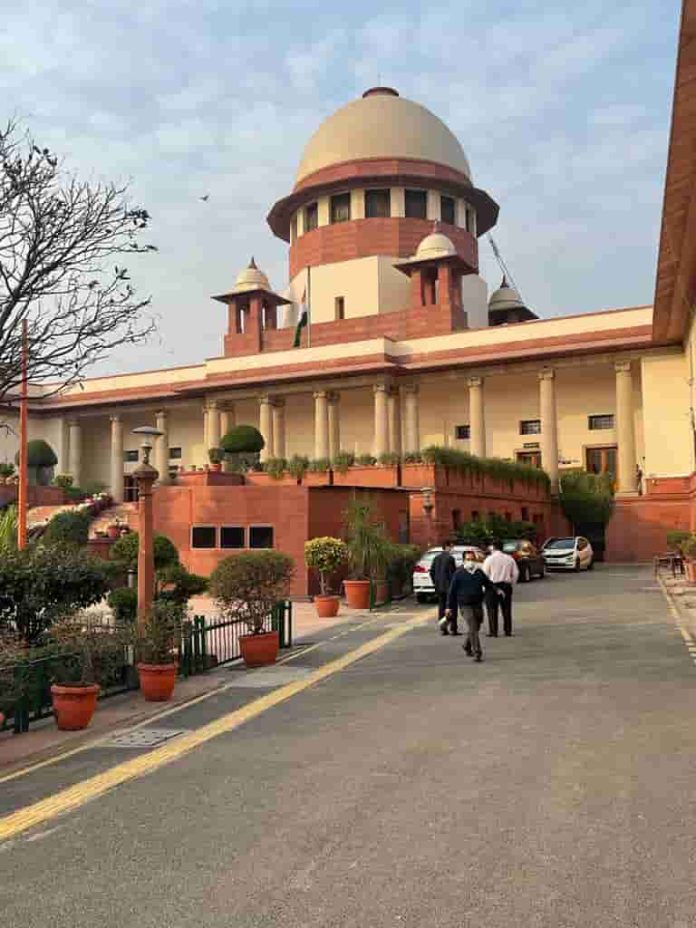The Supreme Court Collegium on Monday proposed the names of three Chief Justices of High Courts for elevation to the Apex Court.
A resolution was passed in this connection by the Collegium comprising Chief Justice of India D.Y. Chandrachud, Justice Sanjay Kishan Kaul, Justice Sanjiv Khanna, Justice
B.R. Gavai and Justice Surya Kant.
The Collegium recommended the following names for elevation to the top court of the country. These are:
- Chief Justice of Delhi High Court Satish Chandra Sharma (parent HC : Madhya Pradesh High Court);
- Chief Justice of Rajasthan High Court Augustine George Masih (parent HC : Punjab and Haryana High Court);
- Chief Justice of Gauhati High Court Sandeep Mehta (parent HC : Rajasthan High Court);
The Collegium resolution said that Justice Satish Chandra Sharma was appointed as a Judge of the Madhya Pradesh High Court on 18 January 2008. He was elevated as Chief Justice of the High Court for the State of Telangana on 11 October 2021 and thereafter transferred to High Court of Delhi on 28 June 2022. Mr Justice Satish Chandra Sharma has served as a judge of the High Court for more than 15 years and as Chief Justice of High Court for more than 2 years. The judgments authored by him dealing with issues in various branches of law stand testimony to his legal acumen and competence. Before his elevation as a Judge of the High Court of Madhya Pradesh, he practised in constitutional, service, civil and criminal matters. Mr. Justice Sharma stands at Sl. No. 2 in the combined all India seniority of High Court Judges. In the seniority of Judges hailing from Madhya Pradesh High Court, Mr. Justice Sharma stands at Sl. No. 1. While recommending his name, the Collegium is aware of the fact that at present, the Bench of the Supreme Court is represented by 1 Judge from the Madhya Pradesh High Court.
About Justice Augustine George Masih
Regarding Justice AG Masih, the Collegium resolution stated as follows :
Mr. Justice A G Masih was appointed as a Judge of the Punjab and Haryana High Court on 10 July 2008. He was elevated as Chief Justice of the Rajasthan High Court on 30 May 2023. During his long tenure as a judge of the High Court Mr Justice Masih has acquired significant experience in diverse fields of law. Before his elevation, he practised in Constitutional, service, labour, and civil matters. Mr. Justice Masih stands at Sl. No. 7 in the combined all India seniority of High Court Judges. In the seniority of Judges hailing from the High Court of Punjab & Haryana, he stands at Sl. No.1. He belongs to a minority community. While recommending his name, the Collegium is aware of the fact that at present, the Bench of the Supreme Court is represented by 2 Judges from the Punjab & Haryana High Court.
About Justice Sandeep Mehta
Regarding Justice Mehta, the Collegium resolution stated as follows :
Mr Justice Sandeep Mehta was appointed as a judge of the Rajasthan High Court on 30 May 2011. Having attained seniority in his parent High Court he was elevated as Chief Justice of the Gauhati High Court and is serving there since 15 February 2023. The Rajasthan High Court which is his parent High Court is a large High Court which does not have representation on the Bench of the Supreme Court. Mr Justice Mehta has served as a judge of the High Court for more than 12 years. During his long tenure as a judge of the Rajasthan High Court and as Chief Justice of the Gauhati High Court, Mr Justice Mehta has acquired significant adjudicatory experience. Before his elevation, he practised before trial courts, High Court and the Supreme Court, mainly in constitutional and criminal laws. The judgments authored by him dealing with issues in various branches of law stand testimony to his legal acumen and competence. Mr. Justice Mehta stands at Sl. No. 23 in the combined all India seniority of High Court Judges. In the seniority of Judges hailing from the High Court of Rajasthan, he stands at Sl. No.1. Apart from according representation to the State of Rajasthan, the appointment of Mr Justice Mehta will provide a value addition in terms of his acquired knowledge and experience.
If the Central government approves all three recommendations, then the Supreme Court will work on its full strength of 34 judges.


